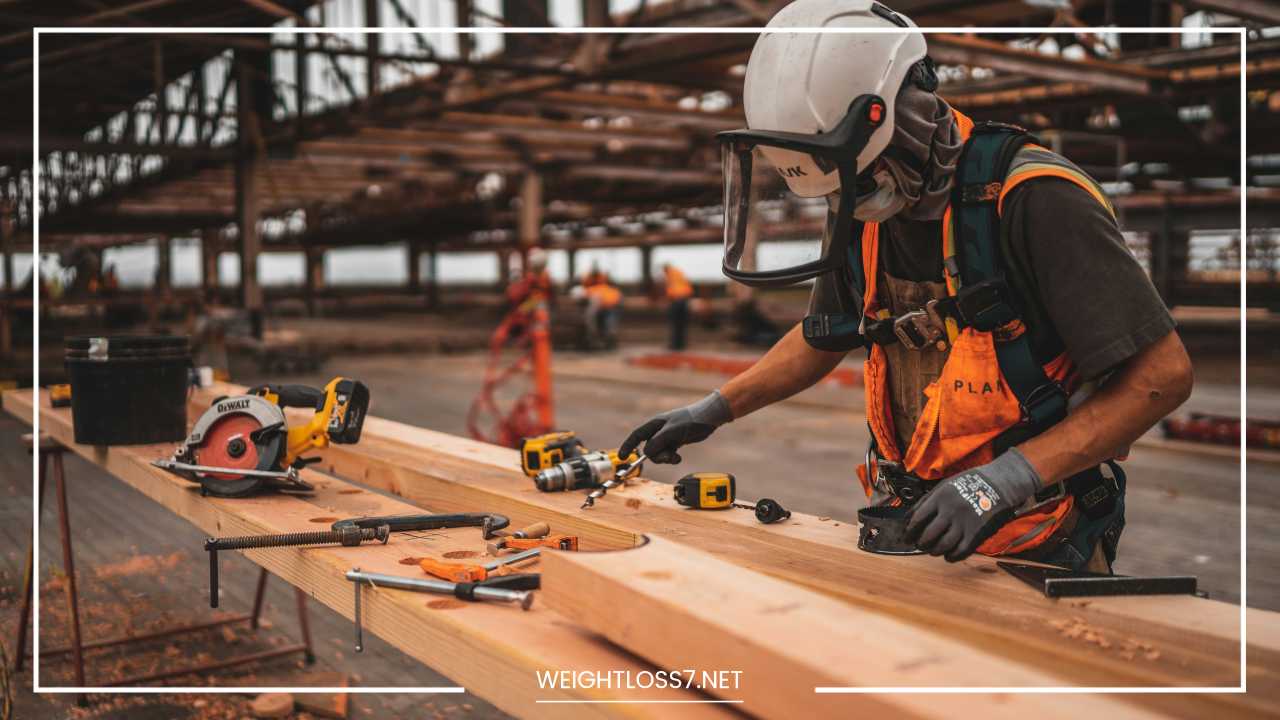Staying Healthy While Working in Construction

Worker Safety
Staying Healthy While Working in Construction: A Blueprint for Peak Performance
The construction industry is the backbone of our built environment. From towering skyscrapers to cozy homes, construction workers are the ones who translate blueprints into reality.
But these physically demanding jobs often come at a cost – a toll on the body that can lead to injuries, fatigue, and long-term health problems.
However, it doesn’t have to be this way. By prioritizing healthy habits, construction workers can stay strong, energized, and injury-free throughout their careers.
This blog post is your blueprint for staying healthy while working in construction, covering everything from nutrition and hydration to exercise, mental wellbeing, and sun safety.
Fueling Your Body: A Recipe for Construction Performance
Construction work burns a lot of calories. To keep your energy levels up and your body functioning optimally, you need to prioritize proper nutrition. Here’s how to craft a healthy eating plan for the jobsite:
-
Start Your Day Right: Don’t skip breakfast! Complex carbohydrates like whole-wheat toast or oatmeal, paired with lean protein like eggs or Greek yogurt, provide sustained energy to power you through the morning. Consider meal prepping on weekends to save time during busy mornings.
-
Pack a Powerful Lunch: Ditch the greasy fast food and pack a lunch that fuels your body. Think lean protein sources like grilled chicken or fish, whole grains like brown rice or quinoa, and plenty of vegetables for essential vitamins and minerals. Include healthy fats like avocado or nuts for satiety. Leftovers from a healthy dinner can be a great lunch option.
-
Snack Smart: Avoid sugary treats and processed snacks that will give you a quick burst of energy followed by a crash. Pack healthy snacks like nuts, fruits, vegetables with hummus, or yogurt with granola for sustained energy and to keep you feeling satisfied. Trail mix with nuts, seeds, and dried fruit is a convenient and portable option.
-
Hydration is Key: Construction sites can be hot and dusty, leading to rapid dehydration. Carry a reusable, insulated water bottle with a capacity you can easily finish throughout the day. Sip on water regularly, even if you don’t feel thirsty. Electrolyte-infused beverages can be helpful for replenishing lost minerals, especially during hot weather or after strenuous activity.
Staying Hydrated: The Foundation for Safety and Performance
Dehydration is a major risk factor for construction workers. It can lead to fatigue, dizziness, decreased concentration, and even heatstroke. Here are some additional tips for staying hydrated:
- Monitor your urine: Dark-colored urine is a sign of dehydration. Aim for pale yellow urine throughout the day.
- Choose hydrating foods: Fruits and vegetables like watermelon, cucumber, and celery have a high water content and can contribute to your daily hydration needs.
- Limit dehydrating drinks: Avoid sugary drinks, excessive coffee, and alcohol, as these can worsen dehydration. Opt for unsweetened iced tea or water with lemon or cucumber for added flavor.
Building a Strong Foundation: Exercise and Injury Prevention
Construction work can put a strain on your body. Here’s how to use exercise to your advantage:
- Dynamic Stretching: Before you start work, perform dynamic stretches like lunges, arm circles, and leg swings to warm up your muscles and improve flexibility. This helps prevent injuries and prepares your body for activity.
- Strength Training: Building strong muscles improves overall fitness, reduces fatigue, and helps prevent work-related injuries. Consider bodyweight exercises like squats, lunges, push-ups, planks, and rows, or weight training if you have access to a gym. Focus on exercises that target major muscle groups used in construction work, such as your back, core, legs, and shoulders. Start with a manageable weight and gradually increase intensity as you get stronger.
- Listen to Your Body: Don’t push yourself too hard, especially when starting a new exercise routine. Take breaks when needed, avoid lifting objects that are too heavy, and pay attention to your body’s signals.
- Proper Lifting Techniques: Learn and practice proper lifting techniques to prevent back strain and other injuries. This includes squatting down to lift objects, keeping your back straight, and engaging your core muscles. If an object is too heavy to lift safely on your own, ask for help from a coworker.
- Warm Down and Stretch: After work, take some time to cool down with light cardio and static stretches. This helps your body recover from the day’s activity and improves flexibility.
Taking Care of Your Mind: Mental Wellbeing on the Jobsite
Construction work can be stressful, with tight deadlines, physical demands, and ever-changing environments. Here are some tips for maintaining your mental wellbeing:
- Get Enough Sleep: Aim for 7-8 hours of sleep each night. Adequate sleep improves concentration, reduces stress, and allows your body to recover properly. Develop a relaxing bedtime routine that helps you wind down before sleep, such as taking a warm bath, reading a book, or practicing relaxation techniques.
-
Manage Stress: Techniques like deep breathing exercises, meditation, or spending time in nature can help manage stress and improve overall well-being. There are many mindfulness apps available that can guide you through meditation exercises. Consider incorporating short meditation sessions into your daily routine, even if it’s just for a few minutes.
-
Connect with Others: Social connection is important for mental health. Build strong relationships with your coworkers and make time for friends and family outside of work. A strong support system can help you cope with stress and challenges.
-
Seek Help if Needed: Don’t be afraid to seek professional help if you’re struggling with stress, anxiety, or depression. Many resources are available to support mental health in the construction industry. Talk to your doctor or a mental health professional about treatment options.
Staying Sun Safe: Protecting Yourself from the Elements
Construction workers spend a lot of time outdoors, exposed to the sun’s harmful UV rays. Here’s how to protect yourself:
-
Wear Sunscreen Daily: Apply broad-spectrum sunscreen with SPF 30 or higher to exposed skin every day, even on cloudy days. Reapply sunscreen every two hours, or more often if sweating or swimming. Choose a water-resistant sunscreen if you’re working up a sweat.
-
Cover Up: Wear long-sleeved shirts, pants, and wide-brimmed hats whenever possible to provide additional protection from the sun. Opt for lightweight, breathable fabrics that wick away sweat.
-
Seek Shade: Take advantage of shade whenever possible, especially during the hottest part of the day (usually between 10 am and 4 pm). Schedule breaks in shaded areas or set up a temporary shade structure on the jobsite if feasible.
-
Stay Hydrated: As mentioned earlier, proper hydration is crucial for regulating body temperature and preventing heatstroke. Sun exposure can increase your risk of dehydration, so be sure to drink plenty of fluids throughout the day.
-
Eye Protection: Wear safety glasses or sunglasses that block UVA and UVB rays to protect your eyes from sun damage.
Building a Safety Culture: A Shared Responsibility
Staying healthy in construction goes beyond individual habits. Fostering a safety culture on the jobsite is essential for preventing injuries and promoting overall well-being. Here are some key aspects:
- Employer Commitment: Employers play a crucial role in creating a safety-first environment. This includes providing proper safety training for workers, enforcing safety protocols, and supplying personal protective equipment (PPE).
- Communication: Open communication between workers and supervisors is essential. Workers should feel comfortable reporting safety hazards and asking questions without fear of reprisal.
- Hazard Identification and Control: Proactive identification and mitigation of safety hazards are crucial. Regularly inspect tools and equipment, ensure proper housekeeping on the jobsite, and address potential hazards before they cause accidents.
- Incident Reporting: Encourage workers to report all near misses and injuries, even minor ones. This helps identify trends and areas for improvement in safety protocols.
Staying Healthy on the Job: A Long-Term Investment
By prioritizing healthy habits and working in a safety-conscious environment, construction workers can enjoy long, fulfilling careers.
Remember, taking care of yourself is not a luxury – it’s an investment in your health, well-being, and earning potential.
The blueprint outlined in this blog post provides a solid foundation for staying healthy while working in construction. By incorporating these tips into your daily routine, you can build a strong foundation for a successful career.
Beyond the Basics: Optimizing Your Health and Performance
While the core principles of healthy living apply universally, construction work presents unique challenges. Here are some additional tips to take your health and performance to the next level:
- Beat the Heat: Working in hot weather can be dangerous. Consider using a cooling bandana or vest to stay cool. If possible, schedule strenuous tasks for cooler parts of the day.
- Ergonomics: Many construction tasks involve repetitive motions or awkward postures. Learn proper ergonomic techniques to reduce strain on your body. This may involve using specialized tools or adjusting your work setup.
- Foot Care: Invest in a good pair of work boots that provide proper support and cushioning. Change out of sweaty boots at the end of the day and keep your feet clean and dry to prevent fungal infections.
- Hearing Protection: Constant exposure to loud noises can damage your hearing. Wear earplugs or noise-canceling headphones whenever working around loud machinery.
- Healthy Habits on the Go: Busy schedules can make it challenging to maintain healthy habits. Pack a portable cooler to keep your lunch and snacks fresh, and utilize breaks for quick workouts or stretches. Look for healthy grab-and-go options at convenience stores or gas stations, like nuts, fruits, or yogurt.
- Post-Work Recovery: Don’t underestimate the importance of recovery after a long day. Take a warm bath to relax your muscles, use a foam roller to target tight spots, and prioritize quality sleep.
Fueling Your Body for Specific Needs:
- Pre-Workout: A small snack with carbohydrates and protein about 30 minutes before starting work can provide a sustained energy boost.
- Post-Workout: Refuel your body after strenuous activity with a combination of carbohydrates and protein to help with muscle repair and recovery. Consider a protein shake or a meal with lean protein and whole grains.
Listen to Your Body and Seek Professional Help:
- Early Intervention: Don’t ignore aches, pains, or injuries. Early intervention can prevent small issues from becoming chronic problems. See a doctor or physical therapist if you experience persistent pain or discomfort.
- Annual Checkups: Schedule regular checkups with your doctor to monitor your overall health and identify any potential health risks early on.
Building a Sustainable Lifestyle:
- Find Activities You Enjoy: Exercise doesn’t have to be a chore. Find physical activities you enjoy, whether it’s playing a sport, joining a gym class, or going for hikes with friends.
- Mindful Eating: Pay attention to your hunger cues and avoid emotional eating. Savor your food and eat slowly to avoid overeating.
- Stay Hydrated Throughout the Day: Carry a reusable water bottle and make a conscious effort to sip on water regularly throughout the day, even if you don’t feel thirsty.
- Manage Stress: Chronic stress can have a negative impact on your physical and mental health. Develop healthy coping mechanisms for stress, such as exercise, relaxation techniques, or spending time in nature.
Final Word
Staying healthy in construction is an ongoing process. By incorporating these tips into your daily routine, prioritizing safety on the jobsite, and building a supportive network, you can empower yourself to thrive in this demanding industry.
Remember, a healthy and resilient body is your greatest asset, allowing you to build a successful and fulfilling career in construction.
Additional Resources:
- The National Institute for Occupational Safety and Health (NIOSH): https://www.cdc.gov/niosh/index.html
- The Occupational Safety and Health Administration (OSHA): https://www.osha.gov/
- The Centers for Disease Control and Prevention (CDC): https://www.cdc.gov/

















